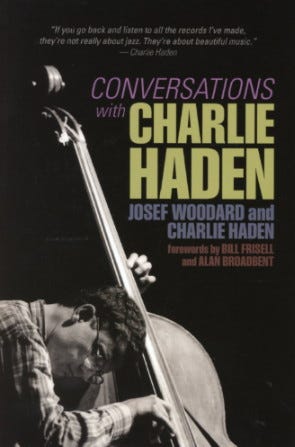My Travels with Charlie [Haden]
© Copyright ® Steven A. Cerra, copyright protected; all rights reserved.
“Charlie Haden (1937-2014) was the rare sort of musician who transcended easy categorization — other than to say that his uniquely elegant and eloquent bass playing, with its readily recognizable sound, defined a certain pinnacle of musical communication in beautiful, spontaneous, and intensely emotional ways. Throughout his career, he worked with and influenced many of the most interesting musicians of the second half of the twentieth century, including Ornette Coleman, Don Cherry, Paul Bley, Carla Bley, Keith Jarrett, Billy Higgins, Paul Motian, Dewey Redman, Pat Metheny, Egberto Gismonti, Gavin Bryars, Geri Allen, Brad Mehldau, Gonzalo Rubalcaba, and literally hundreds of others.
In Conversations with Charlie Haden, Haden discusses his life and politics and music and aesthetics in a series of candid interviews conducted over two decades. While parts of this collection have appeared in various periodicals, much of it is in print here for the first time.”
"From country music in the heartland to bebop in California and free jazz in New York— and back again numerous times over—Charlie Haden's story is a classic American saga, and Josef Woodard allows him to tell it eloquently and in moving detail."
- Francis Davis, author of Jazz and Its Discontents: A Francis Davis Reader
"Charlie Haden's ears, hands, idealism, sentimentalism, curiosity, and
rebelliousness led him to take part in some of the greatest music called jazz;
anything that great is always misunderstood. This book, a transcription of
a twenty-year conversation with regular changes of focus, helps
remedy the situation."
— Ben Ratliff, author of Every Song Ever
"Joe Woodard's treasure trove of interviews with Charlie Haden gives us
such an intimate portrait of the jazz giant that we feel like we're sitting in the room with an old friend. Even better, Haden opens up about his iconic musical associates over the years, allowing us rare access into the insular world of jazz itself."
— Michelle Mercer, author of Footprints: The Life and Work of Wayne Shorter
“When we musicians record something and listen to a playback for the first time, we are usually listening to our own playing and tend to shut out the other players. Not Charlie. He was instantly listening to the group experience and commenting on the positive things he heard. That boosted my confidence tremendously, and opened my eyes to new possibilities as 1 let the other players into my heart.
And that is the essence of Charlie's playing: open ears and open heart. He had a humility when playing that I had not experienced before. I always knew he was listening intensely, and I found myself trusting his wide and full-toned beat, which was like no other. Each note had a singing quality to it. Playing over his beat was like flying on a magic carpet, a carpet you could steer with a slight movement of your body.
Charlie was always listening deeply to music of all kinds that he felt had integrity and some relationship to the truth, be it jazz, country, or classical. Even though he was famous for his recordings with Ornette Coleman, his playing was firmly rooted in tradition. I remember the calls when he would say, "Hey, man," in that high, twinkling voice of his that told me he had something on his mind. Charlie never lost that sense of uncovering something old or something new, and I miss those calls of "Hey, man," which would set us on a new path of discovery.”
Alan Broadbent
Keep reading with a 7-day free trial
Subscribe to CerraJazz Substack to keep reading this post and get 7 days of free access to the full post archives.




